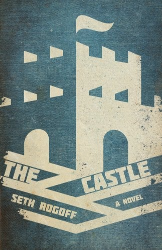Smashing the Tablets: Radical Retellings of the Hebrew Bible is arguably the most exciting creative volume devoted to biblical narrative in years and brims with stunning scriptural and psychological insights. The editors’ Introduction delves astutely into matters such as the productive tensions between orality and textuality and divine versus. human authorship, two questions at the heart of ancient Jewish scriptural tradition. From the outset it becomes clear that both scholarly and general readers will be rewarded by this collection, most of it previously unpublished.
For editors Sara Lippmann and Seth Rogoff, as reflected in the stories, poems, essays, and creative nonfiction of their twenty-three contributors (including recipients of National Jewish Book Awards and other prestigious literary prizes), Jewish storytelling and retelling is “essential, core, foundational — radical.” Following their brief but proficient account of the role of midrash in interpretation, the editors proclaim the ethos of Smashing the Tablets which “seeks to capture the generative energy of the biblical text…the Bible’s openness to interpretation, its wondrous acceptance of incompletion, fragmentation, and internal debate, its intertextual relations, its tensions and contradictions.” They are guided by a paradigm born in antiquity: “The text pulled the sages toward it; the sages pulled the text toward them…Truth exists in the liminal space between sage and text.” The narratives that follow this introduction more than succeed in grappling (often in surprising ways) with these and other dimensions of the Hebrew Bible’s revolutionary textual openness, often by way of contemporary retellings in unexpected settings.
Aptly hailed by the editors as “a spirited takedown of God and the literalists,” Sholom Auslander’s comically acerbic Foreword (“You Suck and Other Stories”) alone is nearly worth the price of admission. The tone of the contributions that follow is refreshingly inconsistent (though structured according to biblical order), some are witty and lightly entertaining, while others are grim or quietly devastating given the somber questions of violence and power that abound, beginning with several pieces that consider the life of Cain. Other reflections are intimately confessional. But always, the range of approaches to language and storytelling proves breathtaking and occasionally uplifting. Trusting the reader’s capacity to wrestle with their complexities, these audacious interventions will likely stir further questioning and perhaps the reader’s own creative mediations. The radical, irreverent, and often profound work gathered here represents some of the best Jewish writing in recent years, which is further distinguished by the international origins of the authors as well as the stirring LGBTQ perspectives included. The contributors to Smashing the Tablets are wonderfully attentive to the women of the Hebrew Bible, named and unnamed, who are after all the catalysts and victims of so much of the action. Courtney Sender’s startling meditation on the midrashic figure of Lilith, Zeeva Bukai’s rendering of Lot’s daughters, Sarah Blake’s searing retelling of Dinah, and Erika Dreifus’s exploration of that lesser-known child sacrifice, Jephthah’s daughter, are among many powerful responses to the roles of patriarchy and the feminine in scripture. Indeed, each of the volume’s thought-provoking readings are imaginatively transformative in their own way and deserve their own mention here but space doesn’t allow for that.
In “Scroll of Stars,” which serves as the collection’s eloquent coda, novelist Michael David Lukas declares: “Sometimes we need to bend the stories we’ve been given if we want to keep ourselves from repeating the same mistakes.” While an absolute gift for those of us teaching Midrash or Bible as literature university courses, this dazzling collection of often magical but never reductively moralistic storytelling will surely entertain and delight every reader. Smashing the Tablets is a triumph of the moral as well as aesthetic imagination and deserves a place in every Jewish library.
Ranen Omer-Sherman is the JHFE Endowed Chair in Judaic Studies at the University of Louisville, author of several books and editor of Amos Oz: The Legacy of a Writer in Israel and Beyond.





